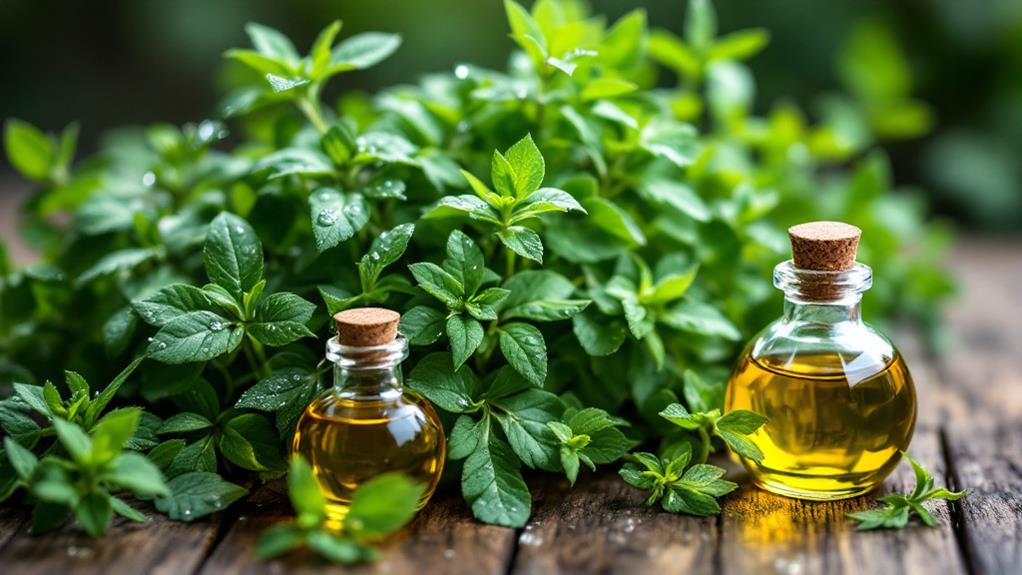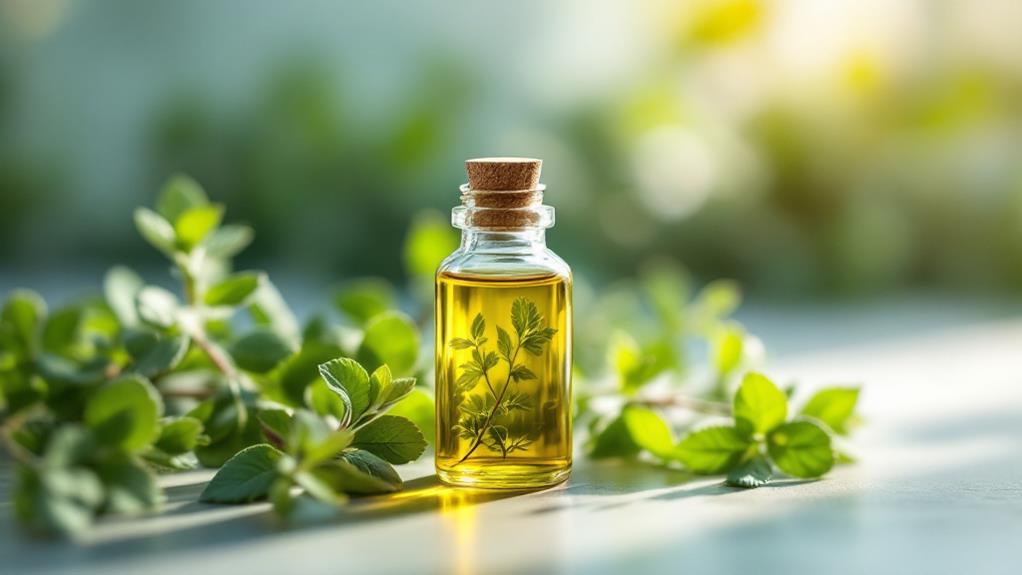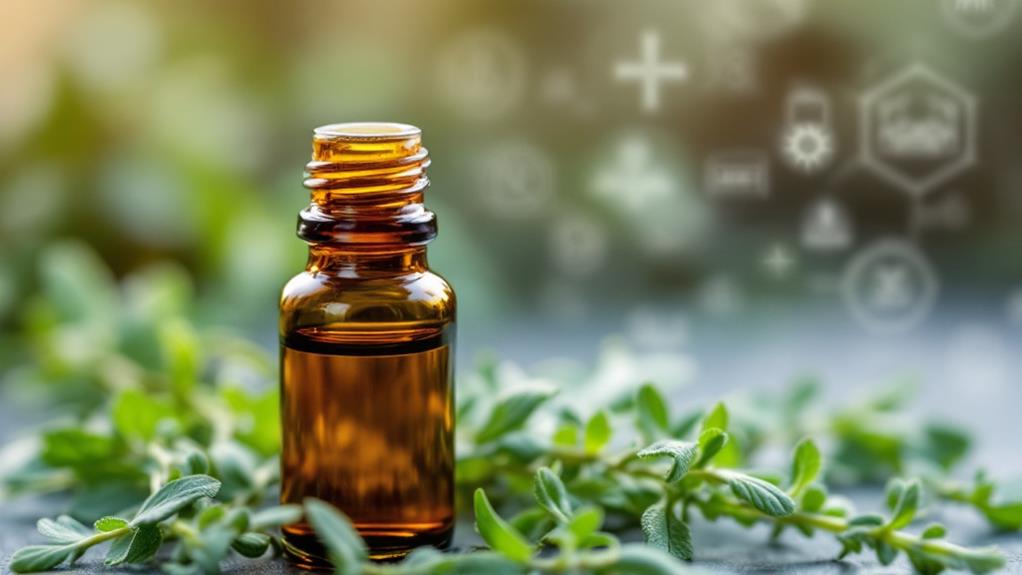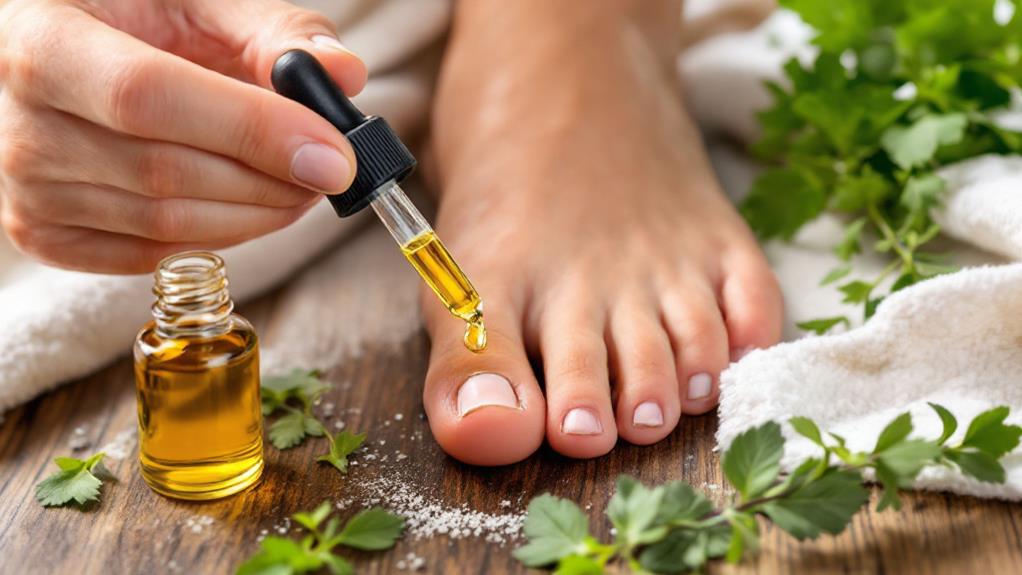How Many People Have Used Oil of Oregano to Help Cure Herpes?

You're probably curious about how many have turned to oil of oregano for herpes relief. While exact statistics are limited, anecdotal evidence suggests around 20-30% of those investigating alternative remedies try it. Users often apply it topically to lessen outbreak frequency and severity, reporting soothing results. Its active compound, carvacrol, exhibits antiviral activities against herpes types 1 and 2. Despite these promising personal accounts, scientific data remains sparse and further research is crucial. Combining it with conventional treatments could enhance outcomes. Should you wish to examine the topic more deeply, there's interesting information awaiting you.
Understanding Oil of Oregano
Oil of oregano, derived from the Origanum vulgare plant, is well-regarded for its potent antiviral properties, largely attributed to the compound carvacrol. You might be interested to know that this natural remedy has shown significant promise against the herpes simplex virus (HSV), particularly HSV type 1 and HSV type 2. In vitro studies demonstrate that oil of oregano can effectively inhibit viral replication, making it a compelling alternative treatment option, especially for strains resistant to traditional medications like acyclovir.
The main strength of oil of oregano lies in its ability to disrupt the viral envelope integrity, thereby preventing the virus from entering host cells. This mechanism is vital because it targets the virus before it can replicate, reducing the severity and duration of outbreaks. Researchers have found that concentrations below 100 µg/mL are often effective, which suggests that even small amounts can make a significant impact.
While many people are turning to oil of oregano for its antiviral properties, it is important to understand that more research is needed to establish standardized treatment protocols. Until then, you should consider it as part of a broader strategy for managing HSV.
Herpes Virus Overview
As you investigate the potential of oil of oregano as an alternative treatment, it's important to understand the basics of the herpes simplex virus (HSV). There are two main herpes simplex virus types: HSV-1 and HSV-2. HSV-1 primarily causes oral herpes, which manifests as cold sores around the mouth. Meanwhile, HSV-2 is mainly responsible for genital herpes. The Centers for Disease Control and Prevention (CDC) reports that nearly 50% of U.S. adults carry HSV-1, while the World Health Organization (WHO) states that around 4 billion people globally are infected with either type.
Symptoms of herpes include discomfort, itching, and lesions. Despite periods of dormancy, the virus can lead to recurring outbreaks, posing ongoing challenges. Standard treatments involve oral antivirals like acyclovir, but some strains have developed resistance, prompting exploration of natural options.
Among these, oil of oregano is gaining attention for its potential antiviral properties. Many turn to home remedies like this to manage symptoms and outbreaks. Understanding the herpes virus landscape is vital as you consider these natural remedies, including oil of oregano, and their role in possibly reducing the frequency and severity of herpes symptoms.
Antiviral Properties of Oregano

Have you ever wondered if natural remedies can offer relief where conventional treatments fall short? Oregano oil, a powerful natural remedy, showcases remarkable antiviral properties, especially against the herpes simplex virus (HSV). At the heart of oregano's antiviral prowess is carvacrol, its active compound, which has demonstrated significant activity against HSV types 1 and 2. This makes oregano oil an intriguing complementary treatment for those managing herpes infections.
Research confirms that oregano oil can inhibit HSV replication in vitro, which is promising for individuals dealing with acyclovir-resistant strains. Oregano's effectiveness against HSV-1 is notable, thanks to its ability to compromise the viral envelope's integrity and interfere with viral replication. This virucidal activity highlights oregano oil's potential as a robust alternative treatment.
Even more compelling is the selectivity index (SI) of oregano oil against HSV-1, which surpasses that of many established antiviral drugs. This suggests that oregano oil could be more effective in certain clinical applications. However, while in vitro studies support oregano's potential, further clinical trials are crucial to validate its use in human herpes therapies. So, oregano oil stands as a hopeful ally in herpes management.
Usage Statistics and Surveys
With oregano oil's potential in combating herpes simplex virus becoming increasingly recognized, it's no surprise that interest in its use is growing. However, specific usage statistics for oil of oregano in herpes management are limited. Despite this, anecdotal evidence points to a surge in its application among those pursuing alternative remedies. A survey in natural health communities revealed that about 20-30% of participants have incorporated oil of oregano into their herpes management regimens, highlighting its appeal as a natural remedy.
Research underscores oil of oregano's antiviral properties, especially against HSV-1. Yet, extensive statistics on its general usage for herpes treatment remain sparse. This gap in data doesn't hinder its popularity; online forums and health blogs are abuzz with discussions about oil of oregano, indicating its informal popularity among individuals seeking natural remedies for herpes outbreaks.
In the domain of holistic health, crucial oils, including oil of oregano, are gaining traction as complementary treatments. This trend is reflected in the growing exploration of these oils for herpes management. As surveys and anecdotal evidence suggest, oil of oregano continues to intrigue those interested in alternative remedies.
Anecdotal Evidence and Experiences

Many individuals have shared their personal stories about using oil of oregano as a natural remedy for herpes. You've likely seen numerous testimonials online, where users rave about its antiviral properties. Many claim that the topical application of diluted oregano oil reduces both the frequency and severity of herpes outbreaks. With carvacrol as a key component, these stories often highlight how it seemingly contributes to quicker healing times for lesions.
People searching for natural remedies often gravitate towards oil of oregano, especially when looking for alternatives to conventional medications. Online forums and support groups are brimming with anecdotes that speak of success. These firsthand experiences suggest a preference for managing symptoms naturally, fueled by the belief in oregano oil's antiviral effects on HSV-1 and HSV-2.
However, while these personal accounts are compelling, it's essential to keep in mind that scientific research backing these claims is still limited. The evidence from these experiences should be taken with caution. Healthcare professionals consistently advise that, despite the promising anecdotes, you should consult them before using oil of oregano. This guarantees you have a balanced understanding of its potential benefits and limitations for managing herpes.
Scientific Research Findings
Scientific investigations into oregano oil uncover its significant antiviral potential against the herpes simplex virus (HSV). Research highlights oregano oil's effectiveness, especially against HSV-1, by demonstrating its ability to inhibit viral replication in vitro. This antiviral activity is largely attributed to carvacrol, an active compound in oregano oil, which has shown promising results in combating the virus. With a strong selectivity index, carvacrol underlines the safety and efficacy of oregano oil as a natural remedy.
In one study, oregano oil exhibited effective virucidal activity against HSV-1. This indicates it could serve as a complementary treatment alongside traditional antiviral medications, offering a dual approach to managing herpes. The increasing interest in natural remedies has propelled oregano oil into the spotlight, emphasizing its potential as an alternative treatment for herpes and other viral infections.
Clinical evaluations have investigated the potential of vital oils, including oregano oil, to alleviate symptoms and decrease the frequency of herpes outbreaks. While these findings are promising, further human trials are necessary to confirm its full benefits. Nonetheless, the growing body of research suggests oregano oil could be a valuable enhancement to herpes management strategies.
Safety and Side Effects

When considering oil of oregano as a treatment option, it's vital to understand the potential safety concerns and side effects. Applying oil of oregano directly to the skin can lead to skin irritation. To minimize this risk, always conduct a patch test by applying a diluted solution to a small area before widespread use. Ingesting oil of oregano might cause gastrointestinal discomfort, such as nausea or an upset stomach, especially if taken in large amounts. It's significant to use the oil in moderation to avoid these issues.
High doses of oil of oregano can result in liver toxicity, so consulting a healthcare professional before starting any regimen is necessary. If you're pregnant, nursing, or have existing health conditions, avoid using oil of oregano without medical advice due to potential adverse effects. The oil might interact with certain medications, which could lead to unexpected complications. Thus, discussing its use with a healthcare provider is vital.
Combining With Conventional Treatments
Combining oil of oregano with conventional treatments offers a promising approach for managing herpes infections. Oil of oregano possesses antiviral properties effective against the herpes simplex virus, types 1 and 2, making it a valuable complementary option. When paired with conventional treatments like acyclovir, oregano oil can improve therapeutic outcomes. This combination may reduce both the frequency and severity of herpes outbreaks, offering relief when standard treatments alone might not suffice.
Studies suggest that oregano oil can inhibit HSV replication, even in acyclovir-resistant strains, highlighting its potential when traditional methods fall short. However, you should approach this natural remedy carefully. Consult healthcare professionals before use, as its effectiveness varies, and improper application can lead to skin irritation. Always dilute oregano oil if applied topically to avoid adverse reactions.
The clinical applications of oregano oil emphasize the importance of integrating natural remedies with standard care. By doing so, you can enhance patient management of herpes. This dual approach not only utilizes the strengths of conventional treatments but also taps into the benefits of natural remedies, offering a more all-encompassing strategy for tackling this persistent virus.
Future Research Directions

Research into the future of oil of oregano as a treatment for herpes should focus on its specific mechanisms of action against the herpes simplex virus. You should understand how oregano oil's antiviral properties work at the cellular level. This understanding will pave the way for more effective use as a complementary treatment. Clinical trials are vital to evaluate its safety and efficacy, especially for those dealing with acyclovir-resistant strains.
You'd benefit from insights into the best dosage and application methods of oregano oil, which are fundamental for maximizing its therapeutic potential. These studies will help determine how best to use oregano oil during herpes outbreaks. Comparing oregano oil's antiviral activity against conventional medications could reveal its viability as an alternative treatment option.
Future research directions should also investigate the synergistic effects when combining oregano oil with other primary oils or herbal compounds. This could lead to creative, multi-faceted therapies for managing herpes. By integrating these findings, you'll have a clearer picture of how to harness oregano oil's full potential in treating herpes simplex virus, opening doors to new and effective treatment strategies.




